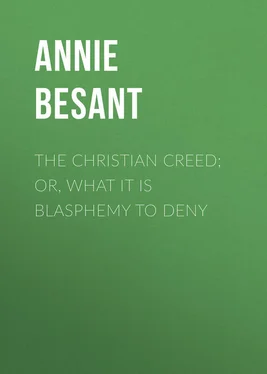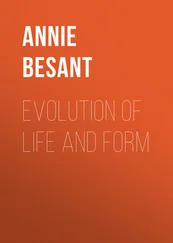Annie Besant - The Christian Creed; or, What it is Blasphemy to Deny
Здесь есть возможность читать онлайн «Annie Besant - The Christian Creed; or, What it is Blasphemy to Deny» — ознакомительный отрывок электронной книги совершенно бесплатно, а после прочтения отрывка купить полную версию. В некоторых случаях можно слушать аудио, скачать через торрент в формате fb2 и присутствует краткое содержание. Жанр: foreign_antique, foreign_prose, на английском языке. Описание произведения, (предисловие) а так же отзывы посетителей доступны на портале библиотеки ЛибКат.
- Название:The Christian Creed; or, What it is Blasphemy to Deny
- Автор:
- Жанр:
- Год:неизвестен
- ISBN:нет данных
- Рейтинг книги:5 / 5. Голосов: 1
-
Избранное:Добавить в избранное
- Отзывы:
-
Ваша оценка:
- 100
- 1
- 2
- 3
- 4
- 5
The Christian Creed; or, What it is Blasphemy to Deny: краткое содержание, описание и аннотация
Предлагаем к чтению аннотацию, описание, краткое содержание или предисловие (зависит от того, что написал сам автор книги «The Christian Creed; or, What it is Blasphemy to Deny»). Если вы не нашли необходимую информацию о книге — напишите в комментариях, мы постараемся отыскать её.
The Christian Creed; or, What it is Blasphemy to Deny — читать онлайн ознакомительный отрывок
Ниже представлен текст книги, разбитый по страницам. Система сохранения места последней прочитанной страницы, позволяет с удобством читать онлайн бесплатно книгу «The Christian Creed; or, What it is Blasphemy to Deny», без необходимости каждый раз заново искать на чём Вы остановились. Поставьте закладку, и сможете в любой момент перейти на страницу, на которой закончили чтение.
Интервал:
Закладка:
Annie Besant
The Christian Creed; or, What it is Blasphemy to Deny
THE CHRISTIAN CREED; OR, WHAT IT IS BLASPHEMY TO DENY
A struggle has began, which promises to be one of the fiercest that this century has seen, between the bigots and persecutors on the one hand and the supporters of free speech on the other.
It appears, then, worth while to look closely into this Christian creed, which claims the right to imprison and torture men of pure life for non-belief in its tenets. Christianity threatens us with persecution here and damnation hereafter if we do not believe its doctrines. "He that believeth not shall be damned," says Jesus. "He that believeth not shall be imprisoned and pick oakum," says Mr. Justice North. The threat of damnation would trouble us little if it stood alone-we could put off consideration of that until we arrived in the other world; but the threat of imprisonment here is unpleasant. If we are to burn for ever hereafter, the Christians might really allow us to enjoy ourselves here; is their malice (like their hell) such a bottomless pit that an eternity of torture is not enough to fill it up?
Let us see what we must believe on peril of damnation and Newgate. (1) We must believe the "Holy Scriptures of the Old and New Testaments to be of divine authority;" (2) we must believe each "one of the persons in the Holy Trinity to be God," while (3) we also believe that there are not "more gods than one;" (4) we must believe the "Christian religion to be true;" we are strictly forbidden to publish any "ludicrous matter relating to God, Jesus Christ, or the Bible, or the formularies of the Church of England as by law established," and are warned that we shall not be saved by our remarks being "intended in good faith as an argument against any doctrine or opinion."
(1) We must believe the Holy Scriptures of the Old and New Testament to be of Divine Authority.
This first demand on our faith is a very large one, and can only be met by refusing to read any scientific book, to look at any geological or antiquarian collections, to study any kind of natural knowledge; we must erase from our memories all the facts we have learned about the world; we must reject purity and decency of morals; we must revert to a condition of barbarous ignorance and barbarous conduct before we can believe very many parts of the Holy Scriptures are of divine authority. Still, as we are to be imprisoned and damned for not believing this, we must try, and we had better examine a little more exactly what we are to believe on divine authority. Only some of our imposed feats of leger-de-foi will be examined. Those who can accomplish these will not bungle over the rest.
It is of divine authority that god made "a firmament in the midst of the waters" and divided the waters, putting some above it and some below, and this firmament is "heaven" (Gen. i., 6-8). This heaven has windows in it which let the rain through (Gen. vii., 11), and when these windows are closed the rain stops (Gen. viii., 2). It has doors, through which the manna was rained down on the Israelites (Ps. lxxviii., 23, 24). This "sky" is very "strong," as is indeed necessary remembering all it has to support above it, and resembles "a molten looking-glass" (Job. xxxvii., 18). Another reason why it should be very strong is that god has "set" in it the sun, moon and stars. Some of the stars are large and solid, and require a very strong setting.
My unbelieving reader, you may have some difficulty in crediting all this. You may argue that the sky is not strong at all, but is only a vast space, and that to apply the word strong to space shews gross ignorance. Divine authority says the sky is strong, and if you persist in believing facts instead of the Bible, you will at least find Newgate strong and its space limited. You may argue that the stars are at very various distances, and cannot all be set in one arching roof resembling a molten looking-glass; that when it rains, the rain is due to condensation of watery vapor within our atmosphere, at a distance of at the most very few miles, and not to the opening of any windows at a distance of many billions of miles; that the firmament must be at least 5,480,490,000,000 miles away, as the stars are set in it, and the nearest fixed star is at that distance, while the furthest is beyond calculation. All these contentions of yours are facts, I admit, but they fly in the teeth of the fictions which are of divine authority; and as Mr. Justice North is armed with full power to vindicate the divine authority, you had better, if you want to keep out of gaol, give up the facts and pretend to believe in the fictions.
It is of divine authority that god made grass and herb and fruit tree on the "third day of creation," the day before he created the sun, two days before he made fishes and birds, and three days before he made animals. In the face of this it is a mere trifle, my dear sceptical reader, that no herb could yield seed, no fruit tree could yield fruit, without the aid of the sun. It is quite true that a plant without the sun-rays can form no chlorophyll; that without chlorophyll no starch, no reparation nor growth of tissues can proceed. What are these mere botanical facts beside the divine authority of the Holy Scriptures? It is also true that in the study of fossils no traces of all these grasses, herbs, and fruit trees are found precedent to all animal life. That the earliest living thing which has left a trace was an animal, not a plant. That fishes precede fruit trees in the fossilised history of the globe, although fruit trees precede fishes in the divinely authoritative fable. These geological facts must follow the botanical, my heretic, and you must be content to take the Holy Scriptures on faith, for they are not even tales founded on fact.
It is of divine authority that sun, moon, and stars were created on the fourth day, after the world had been in existence for three. It is true that to talk of a member of a solar system like our earth as existing three days before the central sun came into being is to talk nonsense. But that is of no importance if the nonsense is of divine authority. It is also true that the light travelling from part of the Milky Way at the rate of 186,000 miles per second would take 9,000 years (Madler) to reach our earth, so that if the Holy Scriptures are of divine authority we should be unable to see these stars, which we nevertheless do see. Who would rashly put the testimony of everybody's eyes against the authority of this old book written in an unknown tongue, by an unknown author, at an unknown date? If the stars are there, they ought not to be, and if we can see them we ought not to be able to do so. I am not sure that they are not committing a silent and perpetual blasphemy by their very existence; but then Mr. Justice North cannot reach them to put them out, odious as is the outrage they commit on the feelings of the Christian public, and I doubt if the sentence of damnation threatened by Jesus would run in that distant spot.
It is of divine authority that on the 6th day of creation, just 5,887 years ago, god created man, male and female. It is true that man has left his bones in the ground as a record of his existence hundreds of thousands of years ago, although he has only existed during 5,887 years. But that was a thoughtless and irreverent action on his part, which cannot be allowed to have any weight as compared with the divine authority of the Holy Scriptures. Men should not leave their bones about in caves and drifts as arguments for the wicked unbeliever and puzzles for the faithful soul.
It is of divine authority that everything was once created in two different ways, perfectly incompatible the one with the other, and both equally true. The two stories of the creation are mutually exclusive; but, as they are both of divine authority, both must be believed, on peril of prison here and of damnation hereafter. It is blasphemy to deny that the world was covered with water, so that god was obliged to gather it away into one place to let the land appear, which forthwith brought forth from its moist surface herb and grass and tree (Gen. i., 12), and that the world was at the same time so dry that god could not set in it the herb and plant which he had previously made (Gen. ii., 5). It is blasphemy to deny that the vegetation was brought forth by the earth itself at the mere command of god: "Let the earth bring forth grass," etc. (Gen. i., 11). It is also blasphemy to deny that "the Lord God made… every plant of the field before it was in the earth, and every herb of the field before it grew," and that the reason for this creation before planting was that "the Lord God had not caused it to rain upon the earth, and there was not a man to till the ground" (Gen. ii., 5).
Читать дальшеИнтервал:
Закладка:
Похожие книги на «The Christian Creed; or, What it is Blasphemy to Deny»
Представляем Вашему вниманию похожие книги на «The Christian Creed; or, What it is Blasphemy to Deny» списком для выбора. Мы отобрали схожую по названию и смыслу литературу в надежде предоставить читателям больше вариантов отыскать новые, интересные, ещё непрочитанные произведения.
Обсуждение, отзывы о книге «The Christian Creed; or, What it is Blasphemy to Deny» и просто собственные мнения читателей. Оставьте ваши комментарии, напишите, что Вы думаете о произведении, его смысле или главных героях. Укажите что конкретно понравилось, а что нет, и почему Вы так считаете.











